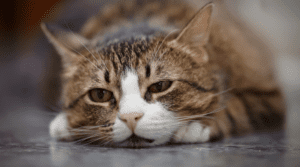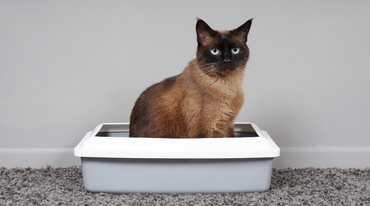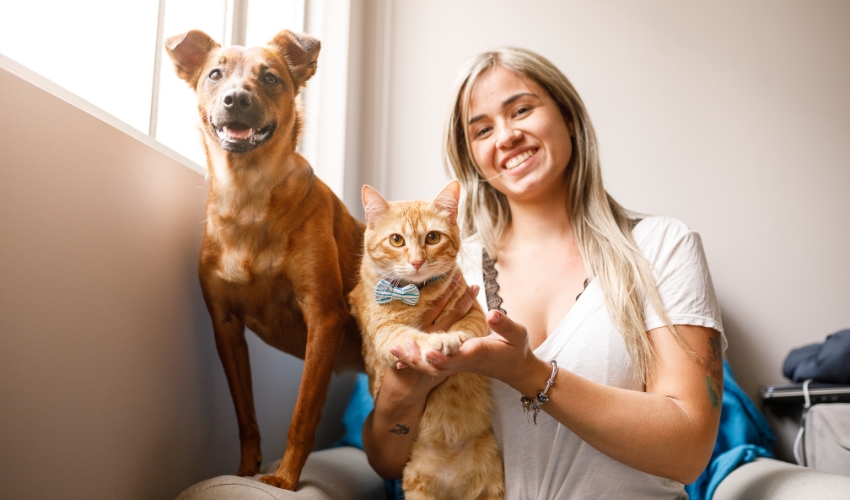Seeing blood in your cat’s stool can be alarming as a cat owner. Several factors can cause bloody stool in cats, ranging from minor issues like diet to more severe conditions like cancer.
This blog post will discuss the common causes of blood in cat stool and what home remedies you can try to alleviate the issue. Understanding the causes and remedies can help you take better care of your feline friend and ensure their good health.
Common causes of blood in cat stools

Let’s explore some common reasons cats might develop bloody stools and how to address these issues effectively. By understanding the root causes, you can provide the best care for your beloved feline companion.
Dietary Factors
Abrupt changes in your cat’s diet can upset its delicate digestive system. Cats can be sensitive to dietary shifts, and consuming something indigestible or sharp objects can lead to irritation in the gastrointestinal tract. This irritation, in turn, may result in bloody stool. To prevent this, ensure a gradual transition when introducing new foods and remove any potential hazards from your cat’s environment.
Parasitic Infections
Internal parasites like roundworms, hookworms, and tapeworms are common culprits behind bloody stools in cats. These parasites disrupt the digestive process and damage the intestinal lining, leading to blood in the stool. As your veterinarian recommends, regular deworming is crucial to prevent these issues. Maintaining a clean living space and avoiding contact with contaminated environments can also reduce the risk of infection.
Gastrointestinal Infections
Bacterial or viral infections in your cat’s digestive system can result in inflammation and bleeding. Conditions such as gastritis or colitis can cause blood in the stool. If you notice accompanying symptoms like diarrhea, vomiting, or changes in appetite, consult your veterinarian promptly. Timely treatment and appropriate medications can help resolve these infections.
Inflammatory Bowel Disease (IBD): Inflammatory Bowel Disease is a chronic condition affecting cats’ digestive tract. This condition involves persistent inflammation that can lead to chronic bloody diarrhea. IBD is typically managed with dietary modifications, medications, and regular veterinary check-ups. Early diagnosis and consistent management are vital to improving your cat’s quality of life.
Constipation
Chronic constipation can cause your cat to strain during bowel movements, resulting in tiny tears in the rectum and blood in the stool. To help alleviate constipation, ensure your cat stays well-hydrated and maintains a fiber-rich diet. Your veterinarian may recommend laxatives or other treatments to promote regular bowel movements in severe cases.
Home remedies for blood in cat stool
#1 Change in Diet
A balanced diet is vital to your cat’s digestive health. Consider feeding your cat a high-protein, high-fiber diet to address blood in their stool. These nutrients help regulate bowel movements, preventing both constipation and diarrhea. Opt for premium-quality cat food that meets your pet’s specific nutritional needs.
It’s crucial to avoid sudden diet or feeding habits changes, as they can lead to intestinal irritation and inflammation. If you plan to switch your cat’s food, gradually transition over several days to minimize digestive upset.
#2 Pumpkin
Canned pumpkin is a natural remedy that can work wonders for your cat’s digestive health. Pumpkin is rich in fiber, which helps regulate bowel movements and improve digestion. Additionally, it boasts natural anti-inflammatory properties that can soothe irritated intestines.
To use pumpkin as a remedy:
- Add a small amount to your cat’s regular food.
- Ensure it’s plain, unsweetened pumpkin, not pumpkin pie filling.
- Start with just a teaspoon and adjust the amount as needed under the guidance of your veterinarian.
#3 Probiotics for Gut Health
Probiotics are beneficial bacteria that support a healthy digestive system. They can help regulate your cat’s gut flora and reduce inflammation. You can introduce probiotics into your cat’s diet by adding supplements or offering probiotic-rich foods like plain yogurt.
Consult your veterinarian before starting any probiotic regimen to ensure you choose the right product and dosage for your cat’s needs.
#4 Herbal Remedies
Herbal remedies can be gentle and effective in soothing your cat’s digestive tract. Two herbs known for their digestive benefits are slippery elm and marshmallow root. These herbs can help alleviate inflammation and irritation in the intestinal lining.
You can incorporate these herbs into your cat’s diet by mixing them with their food or using supplements designed explicitly for feline use. Consult your veterinarian for guidance on dosage and administration.
How to prevent bloody stool in cats
Limit exposure to toxins and unclean environments.
One of the most effective ways to prevent blood in your cat’s stool is to protect it from toxins and unsanitary conditions. Cats are naturally curious creatures and may come into contact with harmful substances outdoors. Keep your cat indoors or provide a safe, enclosed outdoor space to minimize the risk.
Ensure your home environment is free from potential hazards, such as toxic plants, chemicals, and small objects that could be ingested.
Clean and abundant drinking water
Adequate hydration is essential for your cat’s digestive health. Ensure your cat has access to clean, fresh water at all times. Cats are more likely to drink when their water source is clean and contaminant-free. Regularly clean your cat’s water bowl, and consider using a water fountain to encourage them to drink more.
Maintaining a clean water source is essential to prevent bacterial infections that can lead to gastrointestinal issues. Ensure the water remains uncontaminated, especially if multiple pets share the same water bowl.
Takeaway
When we encounter the unsettling sight of blood in our cat’s stool, it can be a cause for concern. However, armed with knowledge and a commitment to their well-being, we can take proactive steps to address this issue.
Incorporating these guides, working with your veterinarian, and with your love and attentive care, your feline friend can enjoy a healthy and comfortable life.
Learn more about pet resources and connect with other animal lovers! Join Doobert, and together, we can make a difference in the lives of our pets.
















